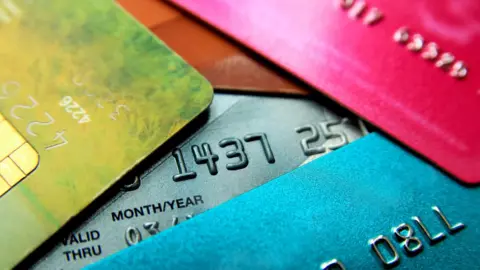Banks fail in bid to share cost of refunding scam victims
 Getty Images
Getty ImagesNegotiations between banks to create a permanent, central pot of money to refund scam victims have collapsed.
Seven banks and building societies had signed up to an interim, shared arrangement, but will now pay for refunds individually.
The pot was being used to fund repayments when neither the bank nor customer were to blame for fraudsters stealing money.
An ongoing code means victims should not lose out on refunds.
In so-called authorised push payment scams, victims are often duped into transferring money to a fraudster in the belief they are a legitimate trader or service.
Thousands of people become victims each year, and millions of pounds are stolen.
A code agreed between banks, affecting customers of 19 financial brands, was signed in 2019 to ensure the victims of these scams are refunded if they have done nothing wrong.
Research has suggested a varying degree of success between different banks in compensating victims.
Central fund
Alongside the code, a plan was drawn up for banks to contribute to a central pot of money. After refunding a victim, the banks could then claim that money from the central pot.
 Getty Images
Getty ImagesOnly seven banks signed up. They were Barclays, HSBC, Lloyds Banking Group, Metro Bank, Nationwide Building Society, NatWest and Santander.
Others - with low fraud levels- deemed it unfair, while TSB decided it would refund victims independently, in all cases.
The signatories, and the banking trade body UK Finance, had hoped others would contribute to a permanent pot, including organisations - such as mobile phone providers - which fraudsters may have taken advantage of to trick victims.
Plans for a permanent central pot of money have now been dropped after months of talks, and various extensions to the interim arrangements.
Katy Worobec, managing director of economic crime at UK Finance, said: "The interim funding pot was originally set up because we had asked that government and regulators work with industry to find a long-term solution to funding of 'no blame' cases, involving other sectors like online platforms, which are used by criminals to perpetrate the fraud, contributing to reimbursing the customer. Sadly, that is yet to happen."
Vim Maru, from one of the original signatories, Lloyds Banking Group, said: "There will be no change for our customers. When the central funding arrangement was first put in place, it was expected that those organisations in the wider ecosystem would also contribute.
"As this has not happened, the arrangement is no longer needed. Protecting our customers from fraud remains our priority and we are committed to reimbursing victims of scams in line with the voluntary code."
